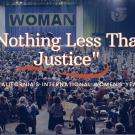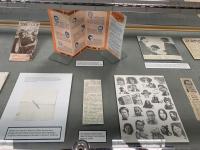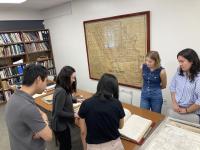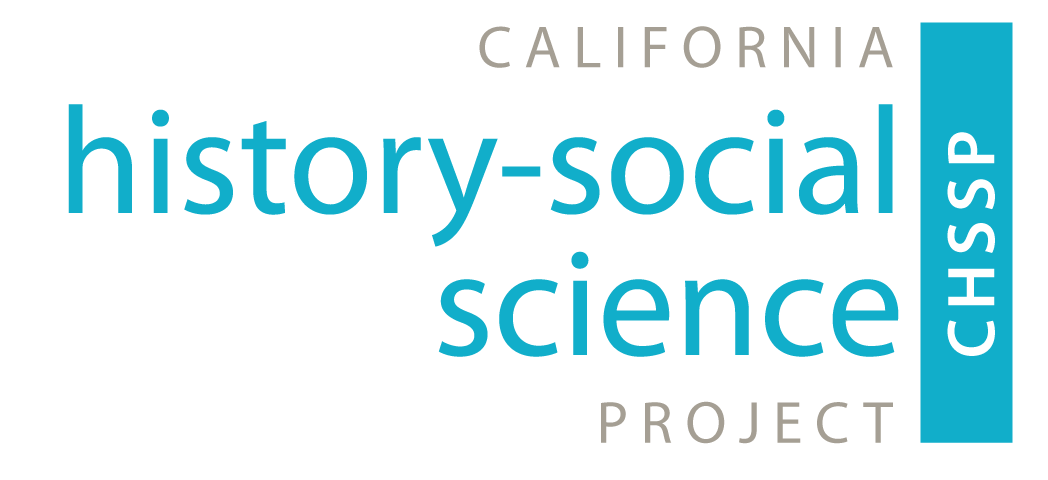The Marchand Center For Public Engagement facilitates multiple History Labs. Each lab brings together diverse history practitioners to address a common theme or historical question. Lab participants include faculty, graduate students, undergraduates, outside scholars, archivists, teachers, and teacher leaders. History Labs serve to advance publicly engaged scholarship and accessible research.
Expand the modules below to learn more about past, current, and upcoming UC Davis History Labs.
The 1977 California Women's Conference

Title: 1977 California Women's Conference History Lab
Term: Winter 2022
Participants: Lisa G. Materson was the Principle Investigator for this lab which brought together undergraduate student researchers, archivists, faculty, graduate students, and independent researchers.
Related Course: HIS102
Description: Materson led her Winter 2022 HIS102 course as a History Lab on the 1977 California Convention. The California Women's Conference was one of 56 state and territorial pre-conferences in which delegates raised issues and agreed upon resolutions to present at the national conference that took place later that year.
Materson designed this lab to contribute to a wider initiative to commemorate the 1977 California Women's Conference which was spearheaded by UCI Professor and Sharing Stories lead Judy Tzu-Chun Wu. See blog post for a more detailed description of Wu's initiative and the multi-campus collaboration.
Student researchers in Materson's history lab researched the life histories of several of these California delegates. They wrote short biographies about these delegates that will be published on Sharing Stories, and they prepared delegate pages for the Nothing Less than Justice virtual exhibit that Wu's research team designed. Lab Participants also presented their research findings, along with other UC research teams, at a virtual conference. This conference was a valuable opportunity for faculty, graduate, and undergraduate researchers from all participating campuses to talk about what they learned.
The Cruz Reynoso Project

Title: The Cruz Reynoso Project History Lab
Term: Part 1: Library Exhibit and Curriculum Development, May 2022-February 2023
Part 2: Summer Institute and Primary Source Development, Summer 2023
Partner Agency: UC Davis Library Archives and Special Collections, California Revealed
Participants: UC Davis History PhD Candidate Daniel Castaneda led the Cruz Reynoso project as one of the inaugural Marchand Center for Public Engagement Interns. The project was a culmination of work by Castaneda, UC Davis Head of Archival Processing Jason Sarmiento, CHSSP teacher leaders, CHSSP staff, graduate student researchers, undergraduate student researchers, and UC Davis faculty.
Description: The Reynoso Project was a multi-stage research initiative that used the archive of Cruz Reynoso, the first Latino Justice to the California Supreme Court and former King Hall Law Professor, to create physical and digital exhibits on his legacy for the University, a public event unveiling the exhibit, a three day summer institute using archival sources, and several K-12 curriculum sets.
Part one of the Reynoso Project consisted of the design and development of a library exhibit showcasing archival materials, as well as the "Reynoso Curriculum Project" which produced curriculum sets for K-12 teachers using the same materials. A public reception on May 26th provided an opportunity for the public to meet and engage with the exhibit and the scholars who produced it. The physical exhibit was housed at UC Davis's Shields Library from May 2022 to February 2023 and used archival materials curated by Castaneda and Sarmiento to celebrate and explore Reynoso's political, legal, and educational career in California. Check out the digital exhibit here.
The curriculum project brought together graduate students, undergraduates, CHSSP staff and teacher leaders, and archivists to produce four curriculum sets for 2nd grade, 4th grade, and 11th grade History courses, as well as one for 12th grade Government. Each of these resources used archival materials to structure lesson plans about Reynoso, Latinx history, California history, and civics engagement.
The second part of the Reynoso Project centered around the Reynoso Summer Institute. The summer institute was a three-day program that brought together K-12 teachers, graduate students, undergraduates, and librarians to work with Cruz Reynoso's Archive at UC Davis, as well as the California Revealed Archives alongside California State Archivists.
Uncovering Diverse Histories of Yolo County

Title: Uncovering Diverse Histories of Yolo County
Term: July 2024-December 2025 (Ongoing)
Partner Agency: Yolo County Archives
Funding: UC Davis Public Impact Research Initiative (PIRI) Grant and University of California Humanities Research Institute (UCHRI) Engaging Humanities Grant
Related Course: HIS 102M, Spring 2025
Participants: Professor Cecilia Tsu is the Principal Investigator for this project. Graduate Student Researchers Sareena Crawford and Frank Meyer, as well as UC Davis undergraduate students, Yolo County Archives staff, and CHSSp staff are also helping support the lab.
Description: This project brings together academic researchers, county archivists, and K-12 educators to research and share the local histories of underrepresented groups in Yolo County, translating archival research into curriculum for K-12 classrooms.
Located between Sacramento and the San Francisco Bay Area, Yolo County was one of the state’s original 27 counties dating to 1850. Although diverse communities of Indigenous peoples, Asian Americans, Latino/as, and African Americans have long inhabited the county, there is scant historical research or broad public awareness about their histories. Most residents do not know that three Patwin tribes consider Yolo County to be their traditional lands or that the first African American resident there arrived in 1854 as an enslaved person. During World War II, Yolo County had the largest number of Mexican braceros in California, while the U.S. government uprooted numerous local Japanese American farm families and incarcerated them.
For this History Lab, a team of student researchers and scholars combed through the Yolo County Archives’ extensive primary source collections, which include property records, court cases, census records, coroner’s inquest files, newspapers, and photographs. The team plans to identify 4-6 historical case studies involving diverse communities to investigate in depth. Working with curriculum experts and teacher leaders and in conjunction with a HIS 102M seminar, the group will develop resources to bring those stories to K-12 students in our community. The project will ultimately pilot the lessons and curriculum resources in local elementary and secondary school classrooms and provide professional learning institutes for educators.
Press:
- "The Power of Place: Local History and the Performing Arts in an Age of Distraction" by Cecilia M. Tsu
- "New Research in the Humanities to Document Diverse Histories in California," UC Davis College of Letters and Science
The Middle East in Historical Context
Title: Middle East in Historical Context
Term: Winter 2025 - Summer 2025 (Ongoing)
Funding: UCOP Addressing Bias and Bigotry Funding
Participants: Principal Investigators are Dr. Beth Slutsky (CHSSP) and Professor Stacy Fahrenthold (UC Davis History). Additional support for this project is provided by UC Davis PhD candidates Ali Neyzi, Charles Sills, and Nina Gonzalez, as well as CHSSP teacher leaders Ireneo Calip and Tricia Cowen, and UC Davis undergraduate students Angela Georgens and Harmony Aragon.
Description: In the Winter 2023, the UC Office of the President granted UC Davis programmatic investments meant to combat antisemitism, Islamophobia and other forms of bias, bigotry and discrimination. CHSSP's Beth Slutsky and UC Davis History Professor Stacy Fahrenthold's proposal "Diverse Narratives: The Middle East in Historical Context" was selected by the UC Davis Committee as a recipient of the Addressing Bigotry and Bias Funding Opportunity.
This History Lab involves professors, CHSSP teacher leaders, and graduate students collaboratively creating both a lecture series and permanent public history resources.
The series will result in the following outcomes:
- Lectures by leading historians of the Middle East on the UC Davis campus, open to the campus community (students, faculty, and staff) as well as the public.
- A digital presentation on Middle Eastern history, comprising of professionally edited videos of the lectures enriched with relevant readings, primary sources, and clickable historical content (to be published on an open-access UC Davis platform).
- A related series of peer-reviewed K-12 lesson plans devised jointly by teacher leaders, UC Davis graduate students, CHSSP staff, and UC Davis professors. (These materials will be co-published on a UC Davis platform and available statewide).
- New faculty/staff partnerships among project partners, as well as between project partners and additional academic units on the UC Davis campus, centered on publicly engaged historical production.
- Meaningful professional development experiences for project graduate students (GSRs) in their work with project faculty, staff, speakers, and K-12 teachers.
Remembered and Forgotten Legacies of the Japanese Colonial Empire
In Spring 2024, Professor Kyu Hyun Kim conducted his Spring 2024 course HIS102N: Remembered and Forgotten Legacies of the Japanese Colonial Empire as a History Lab with the assistance of History PhD Candidate and Marchand Intern Emma Chapman. UC Davis Library's Head of Archival Processing Jason Sarmiento also visited with students to share the basics of archival work and historical research. This lab facilitated collaboration amongst these scholars as students led the creation of a digital exhibit based on their research findings.
Check this page in the future for a link to the digital exhibit!

